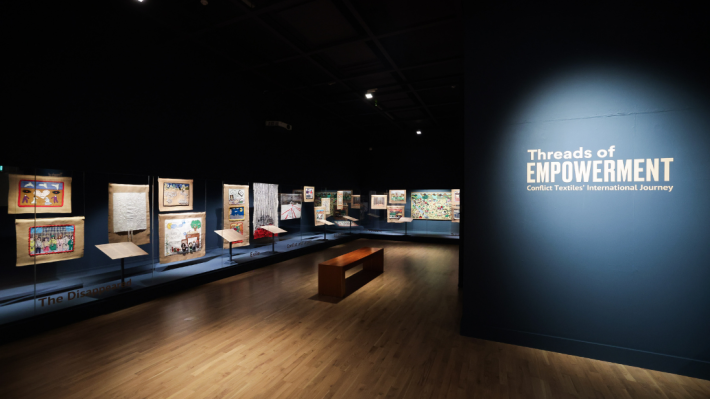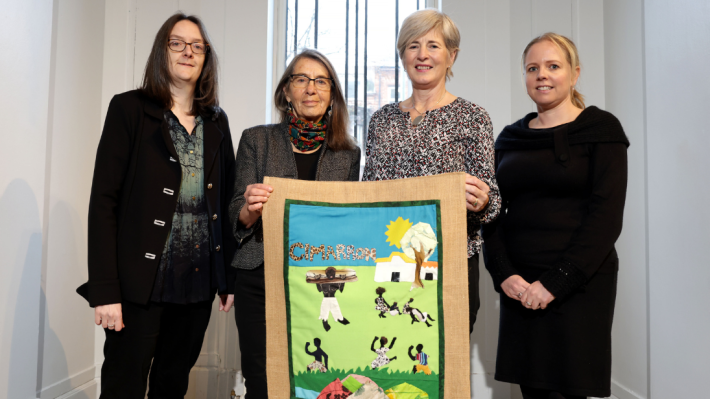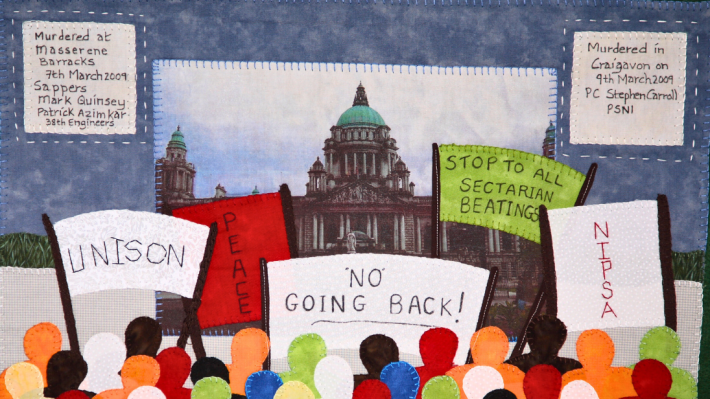
Exhibition highlighting experiences of international testimonies opens at Ulster Museum
Pictured left to right: Karen Logan, Senior Curator of History at National Museums NI; Kim Mawhinney, Senior Curator of Art at National Museums NI; William Blair, Director of Collections at National Museums NI; and Roberta Bacic, curator of the Conflict Textiles collection.
Ulster Museum has today announced the opening of a new exhibition – Threads of Empowerment: Conflict Textiles’ International Journey. The exhibition – which will also feature in the 62nd Belfast International Arts Festival this year - displays 29 textiles from individuals and communities across the world who have experienced violence and conflict, human rights violations, poverty, oppression and environmental issues. The artworks highlight how important a resource artistic expression can be as each piece is based on personal and poignant testimonies.
Roberta Bacic, curator of the Conflict Textiles collection, which includes over 400 artworks, explained how valuable textile art can be as a medium of expression and said:
“When words are not enough to express lived experiences of violence, stitching and sewing emerge as a language. Since the exhibition The Art of Survival: International and Irish Quilts in Derry~Londonderry in 2008, the Conflict Textiles collection has been exhibited around the world, leaving a lasting impression on people, and crucially, empowering more people to share their stories and experiences.
“Our partnership with National Museums NI reflects our commitment to integrating these important works into broader collections in public spaces to foster deeper empathy and understanding of global issues related to conflict, violence, poverty, and human rights violations.”
The works included in the Threads of Empowerment: Conflict Textiles’ International Journey exhibition span a broad range of locations including Chile, Peru, Argentina, Mexico, Zimbabwe and Germany. Many are arpilleras - appliquéd picture textiles that are hand sewn from scraps of materials onto a hessian backing – a practice which originated in Chile during the Pinochet regime (1973-1990) when women came together to voice their experiences of the repressive dictatorship.

One such piece is entitled The Day We Will Never Forget and is an arpillera made by a group of girls in Killarney, Zimbabwe in 2012. It shows the destruction of their informal settlement in May 2005 during the government led ’Operation Murambatsvina’ (get rid of the filth) in which an estimated 500,000 people were evicted and displaced in the space of a month.
In 2022, National Museums NI acquired 14 pieces from the Conflict Textiles collection. Karen Logan, Senior Curator of History at National Museums NI, explains the significance of the exhibition, she said:
“The presentation of these international testimonies relating to human rights is incredibly important in helping people to reflect on the world we live in and some of the issues still faced today. This broad collection of textile art will create conversations that inspire change, encourage empathy and promote community spirit.”
Ulster Museum has long been an important resource for exploring conflict and legacy in Northern Ireland. The Art of the Troubles exhibition in 2014 showcased artistic responses to the conflict and the current Troubles and Beyond exhibition draws upon an internationally significant collection reflecting diverse perspectives and experiences. It situates politics within a wider social, economic and cultural history, beginning with the pivotal year of 1968, and continues onto the present day.
William Blair, Director of Collections at National Museums NI, said:
“We’re 25 years on from the Belfast/Good Friday Agreement, but building the social peace process remains a vital on-going process. Empathy is key to understanding conflict and its legacy, and fostering greater mutual understanding. The Ulster Museum provides a platform for diverse voices and experiences, ranging from local to international perspectives. Threads of Empowerment represents another important contribution to this work, and again highlights the importance of partnership and creative collaboration.”
Threads of Empowerment: Conflict Textiles’ International Journey will run until April 2025 at the Ulster Museum – which is free entry. Booking is not required.
Related content
Threads of Empowerment: Conflict Textiles’ International Journey
Explore the different experiences of conflict, oppression and human rights violations across the world through textiles. Part of Belfast International Arts Festival
Go to exhibition pageHuman Rights Day: Conflict textiles pieces acquired by National Museums NI
Transnational textiles representing the personal experiences of those affected by conflict, including within Northern Ireland, taken into Ulster Museum's collection.
Read newsConflict Textiles
When words are not enough to express lived experiences of violence, stitching and sewing emerge as textile language.
Discover more of the collection

